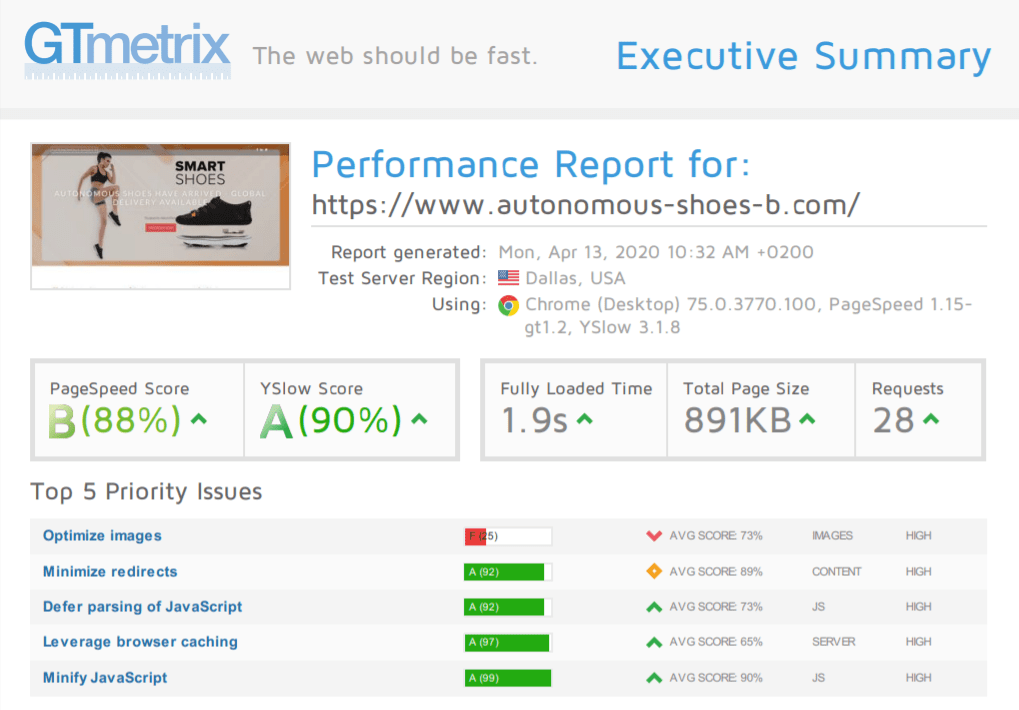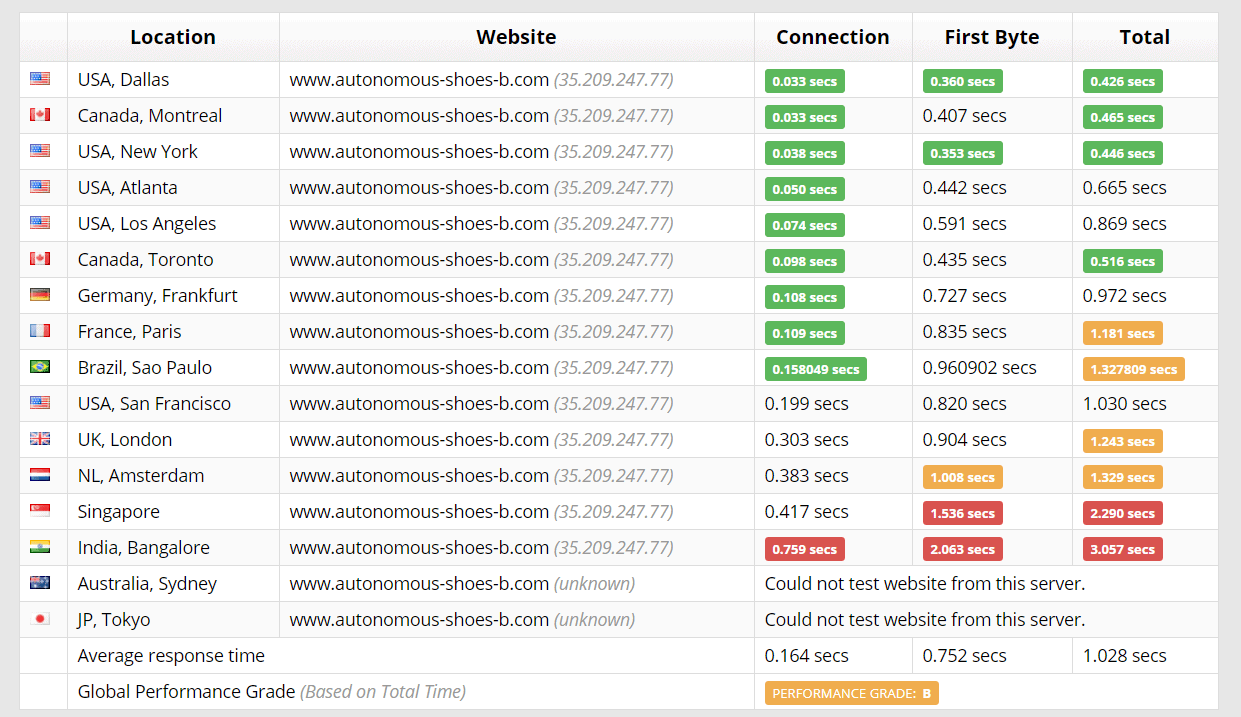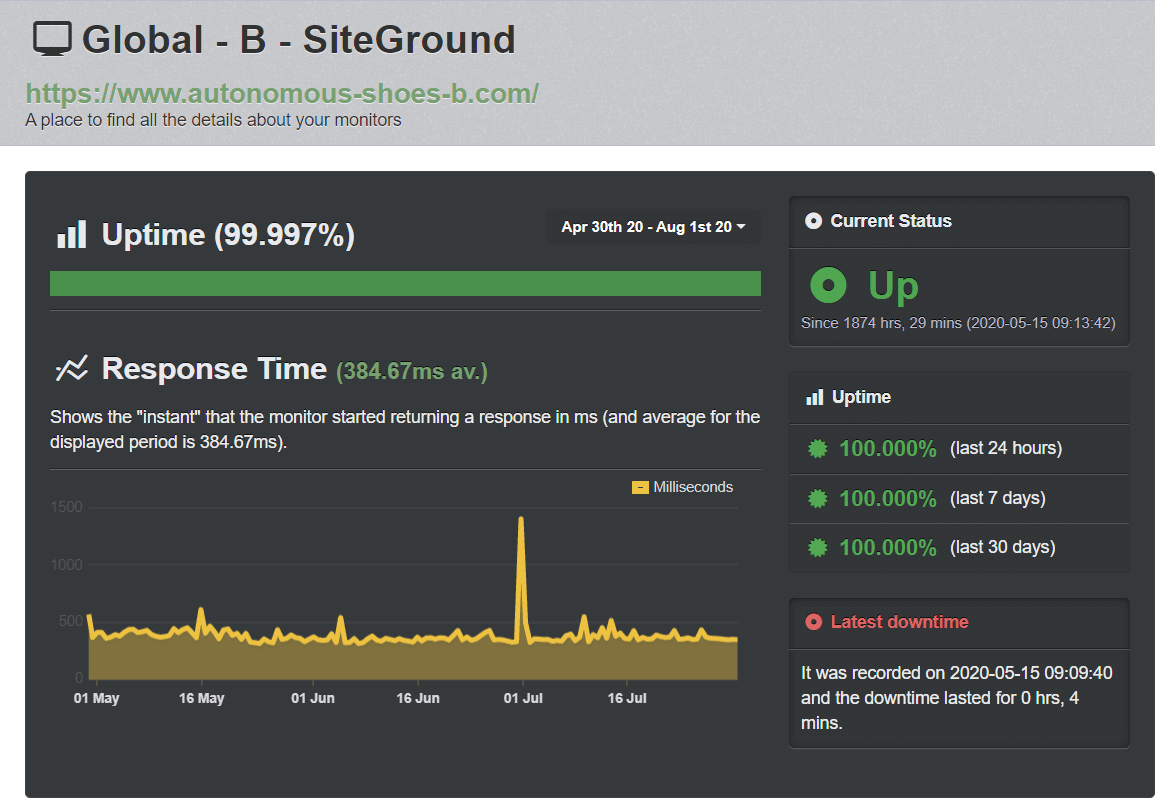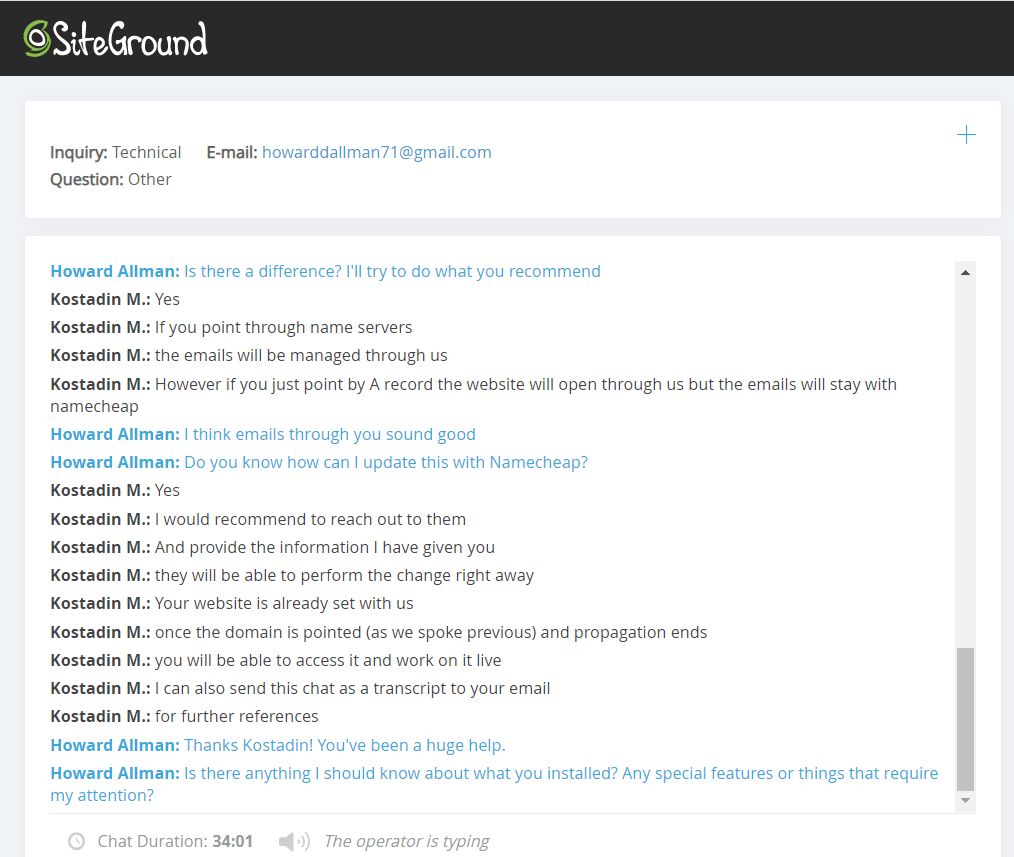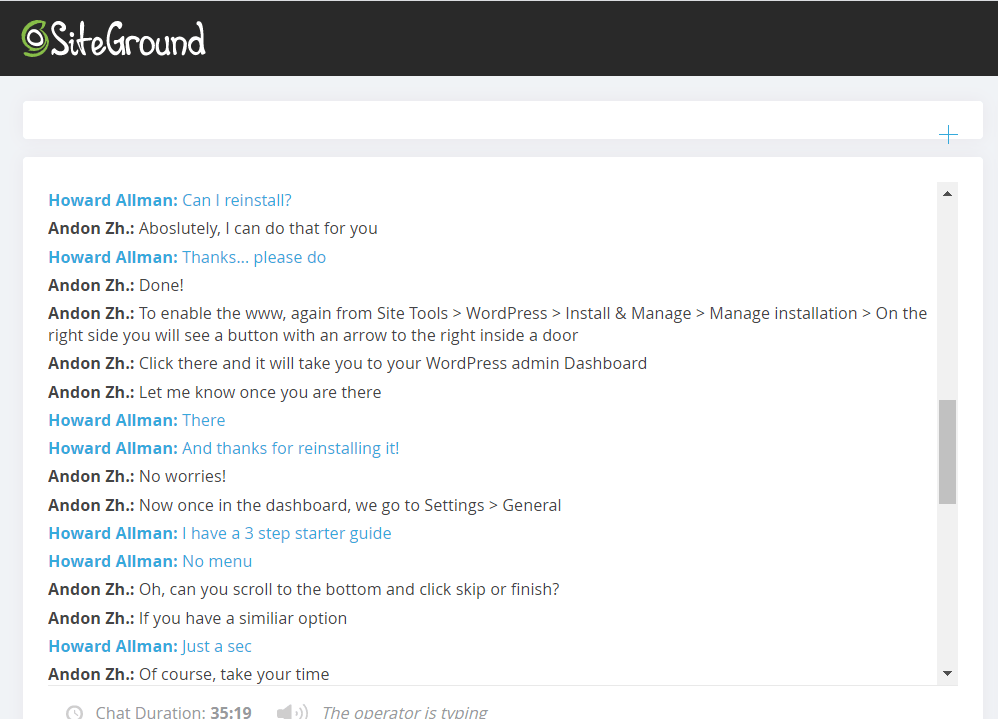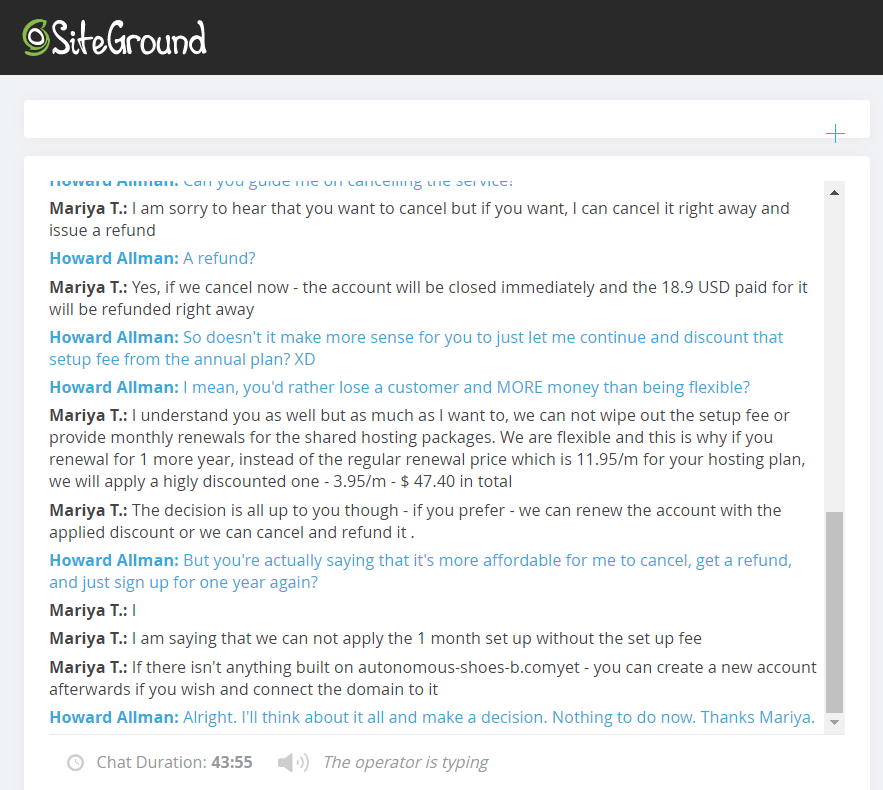SiteGround’s advanced plans offer a lot of powerful features, and the proprietary control panel is one of the best I’ve seen. While the user experience is excellent, my tests show that the performance is not as good as it used to be. Still, SiteGround’s managed WordPress hosting plans could be a good choice for a basic website.
It Used To Be the Best, but Can It Still Hold Up Today?
While Back to the Future Part II gave us a glimpse of a year, at the time, far off in the future, and of what hoverboards can do, it didn’t touch much on the subject of web hosting. But if it did, it would’ve been all about SiteGround. It was all the rage back then, with the consensus being that SiteGround was the obvious go-to, the greatest and most developer-friendly hosting service around.
Well, we’re in 2023 now. SiteGround has gone through a lot of changes, and rumors have been spreading.
With rumors not being my preferred source of information, I signed up to SiteGround with the intention of giving you a complete picture of how things are today. I discovered some good things, but a few not-so-good things as well. Read on to find out if SiteGround could be the right choice for you.
FEATURES
The Basic Plan Is Really Basic, but the Other Two Are Great
Let’s start with the standard features. Three plans are available, out of which the basic one, StartUp, supports only one website, while the other two support unlimited websites. I signed up to StartUp, which comes with 10GB of SSD storage space and enough bandwidth to support around 10,000 monthly visitors.
Scaling up to the two advanced plans will net you more space and more bandwidth, plus the keys to many advanced features. The recurring theme in this section is going to be how the basic plan lacks most of the features that used to make SiteGround great. The advanced plans are much better in this sense, but also more expensive.

Anyways. All plans are based on the NGINX web server technology, one of the most advanced and powerful options available today. This alone is enough to put SiteGround ahead of many old-fashioned competitors.
SiteGround has recently opted to stop using the popular cPanel control panel, and instead has developed its own panel – Site Tools. How does that affect you? For starters, you don’t get the Softaculous auto-installer and its handy library of one-click scripts for hundreds of CMS (content management systems). Instead, you get SiteGround’s App Manager, which supports 18 CMS installations. If your app of choice isn’t on the list, you’ll need to install it manually.
Popular choices like WordPress, Joomla, and Drupal are obviously supported, but more advanced options, like the Laravel and Symfony frameworks, can only be installed manually (Laravel is installed on all servers by default). In any case, if you’re all about WordPress – there’s nothing to worry about.
But even for you WordPress users, things aren’t as easy as they used to be. Softaculous lets you easily launch a staging version of your website, which allows you to try out changes without affecting the live site. SiteGround’s Site Tools does let you create a staging version, but SiteGround has disabled this option in the basic plan.
What about security tools? You know, the stuff that protects you because the internet is a wild jungle? Well, some basic security tools, such as a WAF (web application firewall) and a proprietary monitoring system, are included with all plans by default. If you want the peace of mind that advanced security can provide, you’ll have to pay extra.
I’m assuming that at this point you won’t be surprised to hear that Git, a popular development tool that almost all cPanel hosts offer, is also not included in the basic SiteGround plan.
Keep in mind that as long as your needs are basic, SiteGround still gets the job done. I’d even say that it gets it done very well. The problem is that it used to be a service that could do it all, and suddenly offering less is always an ominous sign.
At least SSL certificates are still available with every plan. This simple but crucial addition to your website secures your visitors and their data, so be sure to activate it. SiteGround’s SSL manager makes it very easy, and my certificate got an A score from Qualys. All excellent news.
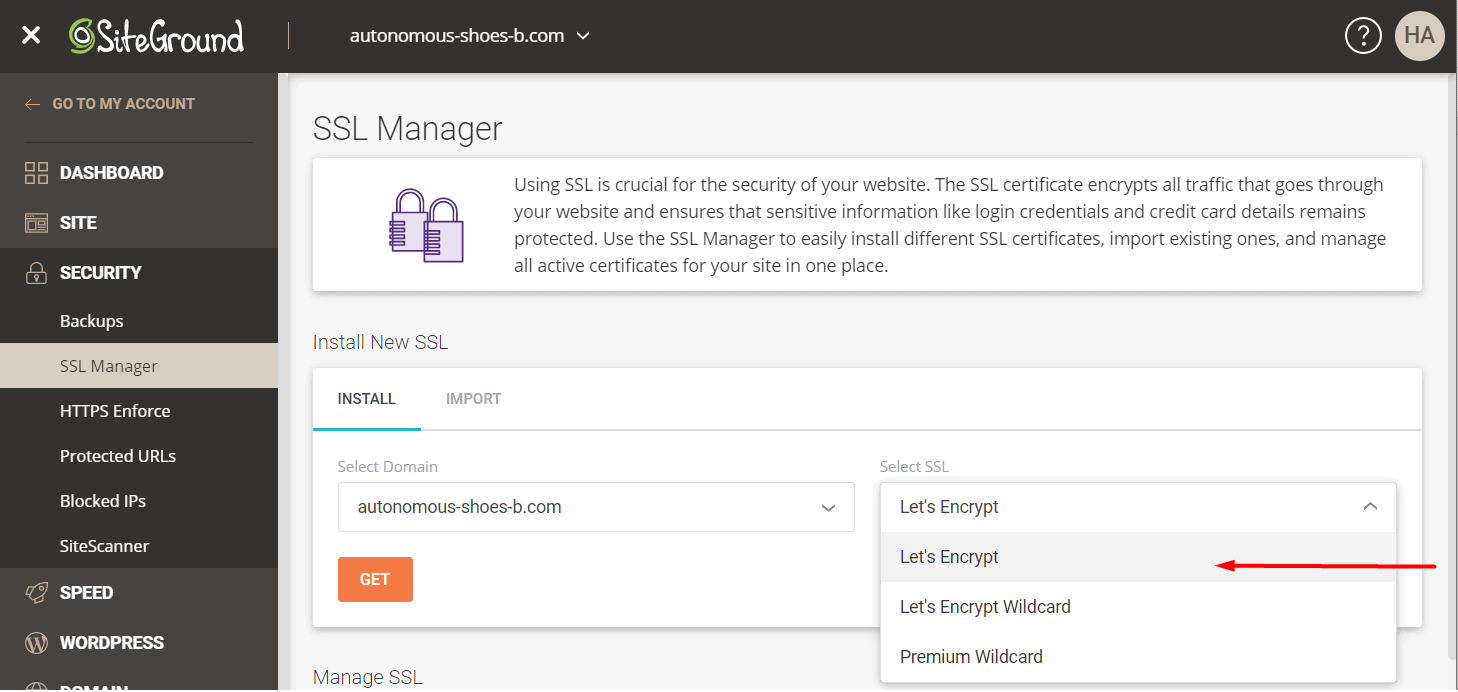
What else does SiteGround have for us?
Automatic System Backups
Backups are one of the most important aspects of hosting, as anything could go wrong at any time. SiteGround automatically backs up your entire system, every day, and keeps each backup for a good 30 days. Few other hosts provide this feature on their basic plan, and some don’t have it at all.
However, on-demand backups, a basic feature that all other hosts do provide, is available only on the advanced plans.
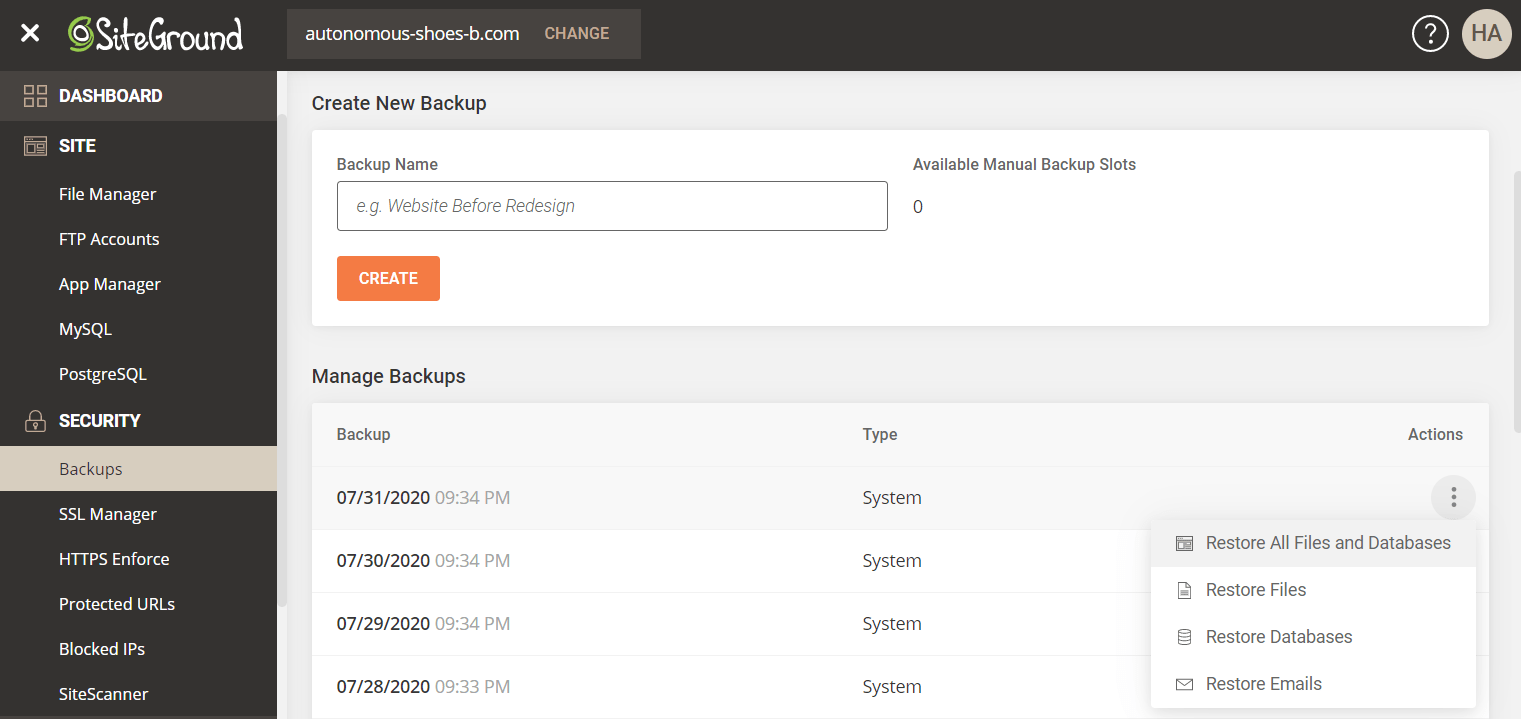
SuperCacher Performance Booster
Caching is the best. Your web server creates copies of your site, and instead of rebuilding each and every page for each and every visitor, it just sends them the cached versions. This takes a huge load off your server, allowing you to serve more visitors and do it much faster.
SiteGround does offer this option, but it limits its power in the basic plan. You’ll get some basic caching, but to enjoy the real thing… you’ll have to upgrade to one of the advanced plans.
Automatic Website Migration
If you have a website hosted elsewhere, you can use the automatic migration option in the panel. The process is simple enough: just install a plugin on your current website and enter the generated token in the SiteGround panel.
This will work for simple websites, but if your website is too complex (many plugins, custom additions, special fields, etc.) there’s a good chance of problems.
You can choose to migrate your website manually via FTP, File Manager, or MySQL – or you can pay extra for a “professional migration” and have SiteGround’s experts take care of everything for you. It’s nice to know this is an option, but it also happens to be an option many web hosts offer for free.
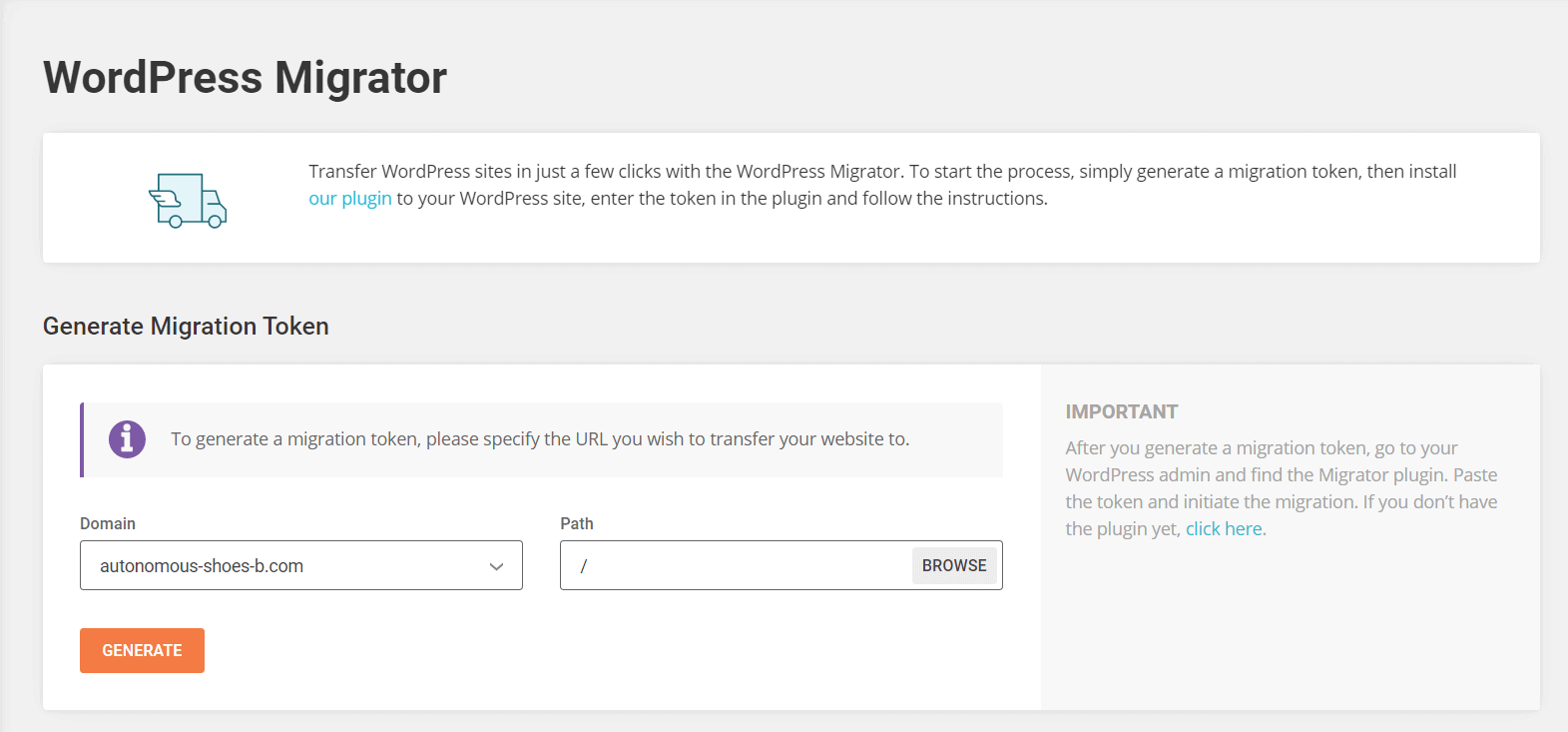
Before we move on, let me just sum up this whole features business real quick – the basic plan is one of the most basic I’ve ever seen. The two advanced plans are rich with powerful features, and deliver an experience much closer to what I expected.
Get Started With SiteGround Today >>
EASE OF USE
SiteGround’s Control Panel Is a True Joy to Use
I was a bit harsh with SiteGround’s features, but that’s what happens when you lock all the goodies behind paywalls. SiteGround’s user experience is a completely different story – other than the signup process, it’s one of the best I’ve seen.
Avoiding all common pitfalls associated with a self-developed control panel, SiteGround’s Site Tools is sleek, smooth, visually-appealing, and modern-looking. The most common actions are easily accessible, and everything else is neatly ordered in a sidebar.
Alright. Let’s break down the process step-by-step.
Choosing Your Plan
While SiteGround advertises both Web Hosting, WordPress Hosting, and WooCommerce Hosting, they’re exactly the same.
SiteGround is very honest about the differences between each of the three plan tiers, so while I’m still not happy with what the basic plan offers, I sure can’t fault the host for lack of transparency. Just make your choice and proceed to the signup page.
Signing Up and Activating Your Account with SiteGround
This really bugged me. It’s a pretty generic signup process, even though I was asked to provide more personal details than I care to share. The annoying part started right after, when I was asked to verify my phone number.
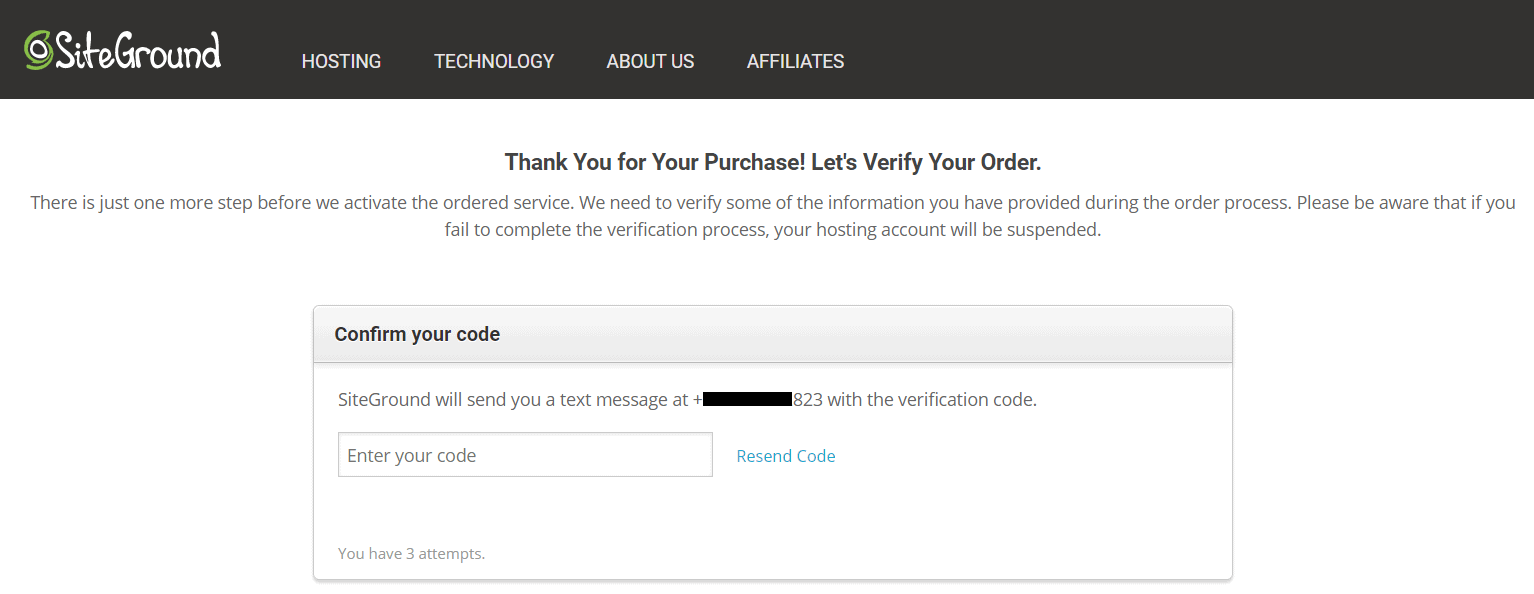
No other host asks for this, and for good reason. Sure, it’s simple on paper, but extra steps are always a recipe for trouble. I, for example, was abroad at the time of signup and had to ask a friend to help me out, which obviously made the process longer. But think about this – if you ask a web developer to open an account for you, you’re now dependent on their phone number for any future verification. Bah.
After getting verified and entering my payment details, I was told that more verification was in order. A small charge was made to my credit card account, and I had to provide the sum. It took an hour until it showed up in my credit card app, but it can obviously take longer.
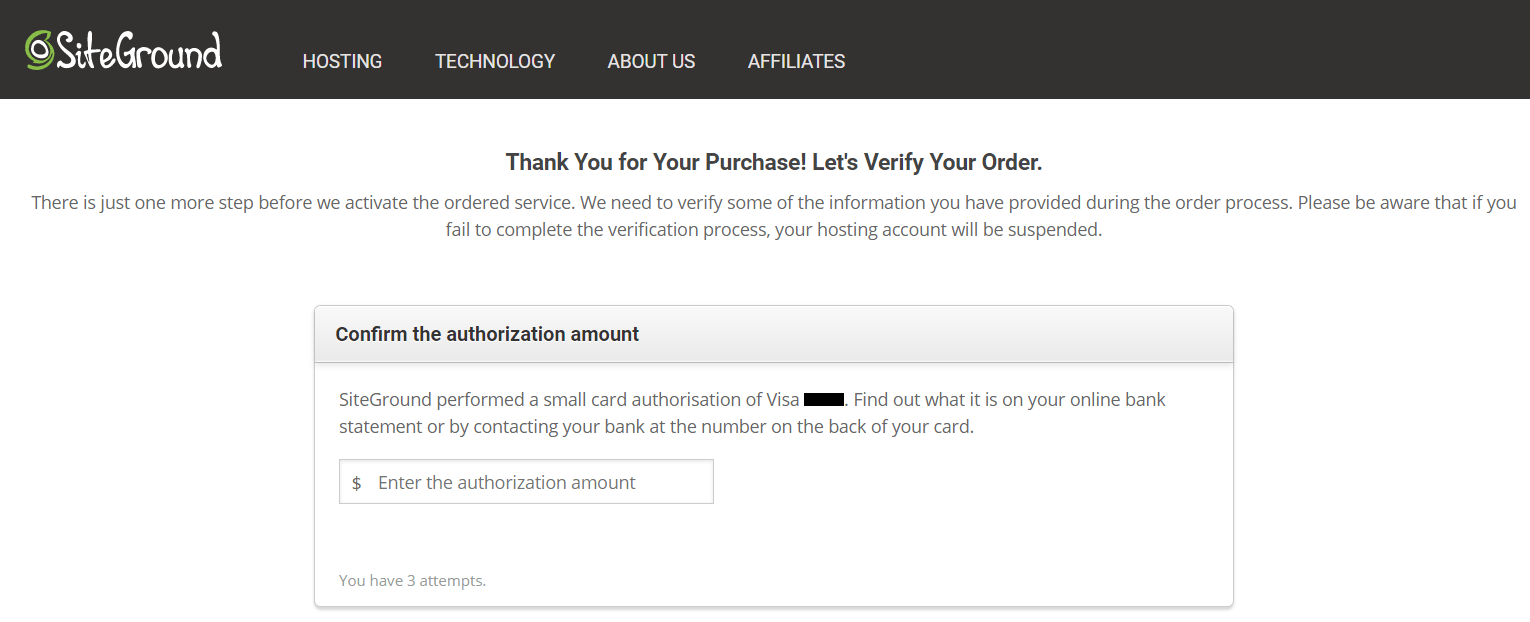
Anyways, after that, I was finally able to complete my signup and get onboard, where things got much nicer.
Connecting Your Domain and Installing WordPress
If you purchase your domain from SiteGround, it will immediately be connected to your hosting account. I like to divide and conquer, so my domains are registered elsewhere. SiteGround made it very easy to connect my domain – the nameservers were readily available in my main dashboard, immediately after signing up.
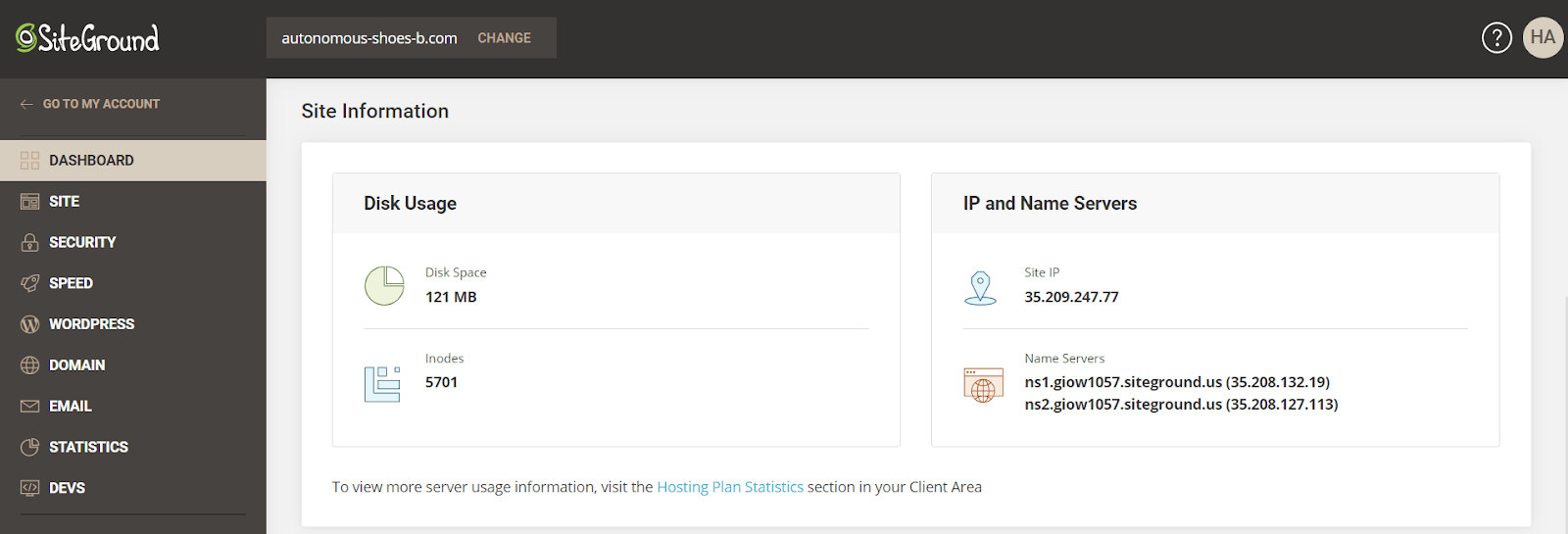
Installing WordPress is just as easy, with SiteGround’s App Manager proving to be a great one-click auto-installer tool.
Any further management of your hosting, from installing SSL certificates to restoring backups, can be done through the same great interface. With clear tab names such as Security, Speed, and WordPress, I trust that you’ll learn to pilot this baby like a pro in no time.
Another great tool for beginners is SiteGround’s proprietary WordPress Starter plugin, which can walk you through the process of choosing a theme for your site and getting everything set up. It includes a collection of well-known WordPress plugins, such as Yoast SEO, Jetpack, WPForms, and more.
PERFORMANCE
SiteGround’s Uptime Is Great, but It’s Not as Fast as It Used To Be
Your site visitors don’t care about your hosting features or ease of use. All your visitors really care about is that your website loads in a flash – always. Those are some serious demands, but they also apply to your competitors. Whichever one of you does a better job will win the visitors’ hearts.
As SiteGround has recently started using Google Cloud Platform, it now provides data center locations in the US, the UK, Netherlands, Germany, Asia, and Australia. These data centers are environmentally-friendly, which is always nice.
That said, I was expecting SiteGround, with its premium pricing, to outperform almost every other host. Imagine my surprise when after months of speed tests, I discovered SiteGround to be… pretty slow.
Not excruciatingly slow or anything, but consistently slower than all the other hosts I’ve tested in our global web hosting comparison project. The average GTmetrix loading times of 2.02s are not great. SiteGround also comes last with its fastest recorded time, 1.4s, and the slowest recorded speed, 2.5s, might make you raise an eyebrow.
Uptime was great, sure, but that’s not enough on its own. Hostinger (1.56s average), Kinsta (1.2s average), A2 Hosting (1.3s average), and many other hosts are simply faster. Much faster. Read on to understand exactly what I tested and what the results mean, or skip on to the support section.
It’s a landing page I designed, complete with HD images, text, effects, and a subscriber option. Very much like what your website might be like, so my results can tell you a lot about what to expect – much more than tests conducted on bare theme installations with no content whatsoever.
I extended SiteGround’s support team the opportunity to optimize my site, but all I got was a laconic “Optimize your images and activate Cloudflare CDN” response. I activated the CDN, but other than that, my website was tested without any optimizations. Let me tell you that with GreenGeeks, for example, the support agent spent the better part of an hour actively optimizing every part of my website himself.
GTmetrix
I used the GTmetrix tool to measure my website’s loading speeds. GTmetrix has many global locations, but I used the Dallas, TX, one – as it was closest to my data center location in Iowa. SiteGround maintains data centers in other locations as well, including the Netherlands, Singapore, and a brand new facility in Australia.
Anyways, after multiple tests over a long period of time, the verdict was in. An average loading time of 2.02s, with 1.4s being the fastest it got and 2.5s being the slowest. This is sub-par performance. Other hosts manage to be at the same time cheaper and much faster.
Here’s one of these GTmetrix tests. Remember that if your website is just a bit heavier, there’s a good chance that loading times will hover over the dreaded 3s mark – where visitors jump ship with no intention of returning.
Sucuri Time Load Tester
Things got a bit better with the Sucuri Time Load Tester, which tests global performance by utilizing a worldwide network of testing servers. Speeds measured by Sucuri are always much faster than GTmetrix, as it doesn’t fully load the website.
In general, SiteGround seems to be doing better here. The average global speed over multiple tests was 1.436s, with the average fastest time (usually in North America, but surprisingly also in Amsterdam a couple of times) being 0.64s, and the average slowest time (in Bangalore, India or Singapore) being 3.244s.
Still, it all seems less impressive when compared to other hosts. Liquid Web’s global average was 0.665s, Kinsta’s 0.631s, and Hostinger’s 0.499s. Less than half the time it took SiteGround.
This is how one of these tests came out:
UptimeRobot
Uptime, measured in percentage, tells us how much of the time our website was available. SiteGround does really well in this aspect, with a 99.997% figure measured over three months. This is excellent stuff, well over the 99.9% it guarantees in its terms of use.
I guess we can sum up SiteGround’s performance by saying it provides excellent uptime, but its poor speeds might become an issue if your website is complex.
Excellent Support Awaits… Eventually
So, will these guys have your back when you find yourself in need of some help? Well, kind of. Once you reach them, SiteGround’s support team is great. They’re helpful, professional, knowledgeable, and happy to help. Still, good luck with reaching them.
The support service is advertised as being available 24/7 through live chat, phone, and tickets. Today there’s also a sales chat option available, but no such option was available when I wanted to try the service. There wasn’t even an email address to ask some pre-sales questions. The only contact information I found was a physical address in Bulgaria, so I never had any chance to communicate with support prior to signing up.
After signing up, I realized that while support was there, it sure wasn’t easy to get to. Instead of having a normal live chat button in the bottom-right corner, SiteGround has a help center.
You have to navigate to the help center, and play that same annoying game you know from trying to contact your cellular provider – try every option they give you and hope one of them ends up in you talking to another human.
Even after clicking my way through it and getting to a contact form, SiteGround didn’t deem my inquiry “detailed enough.”
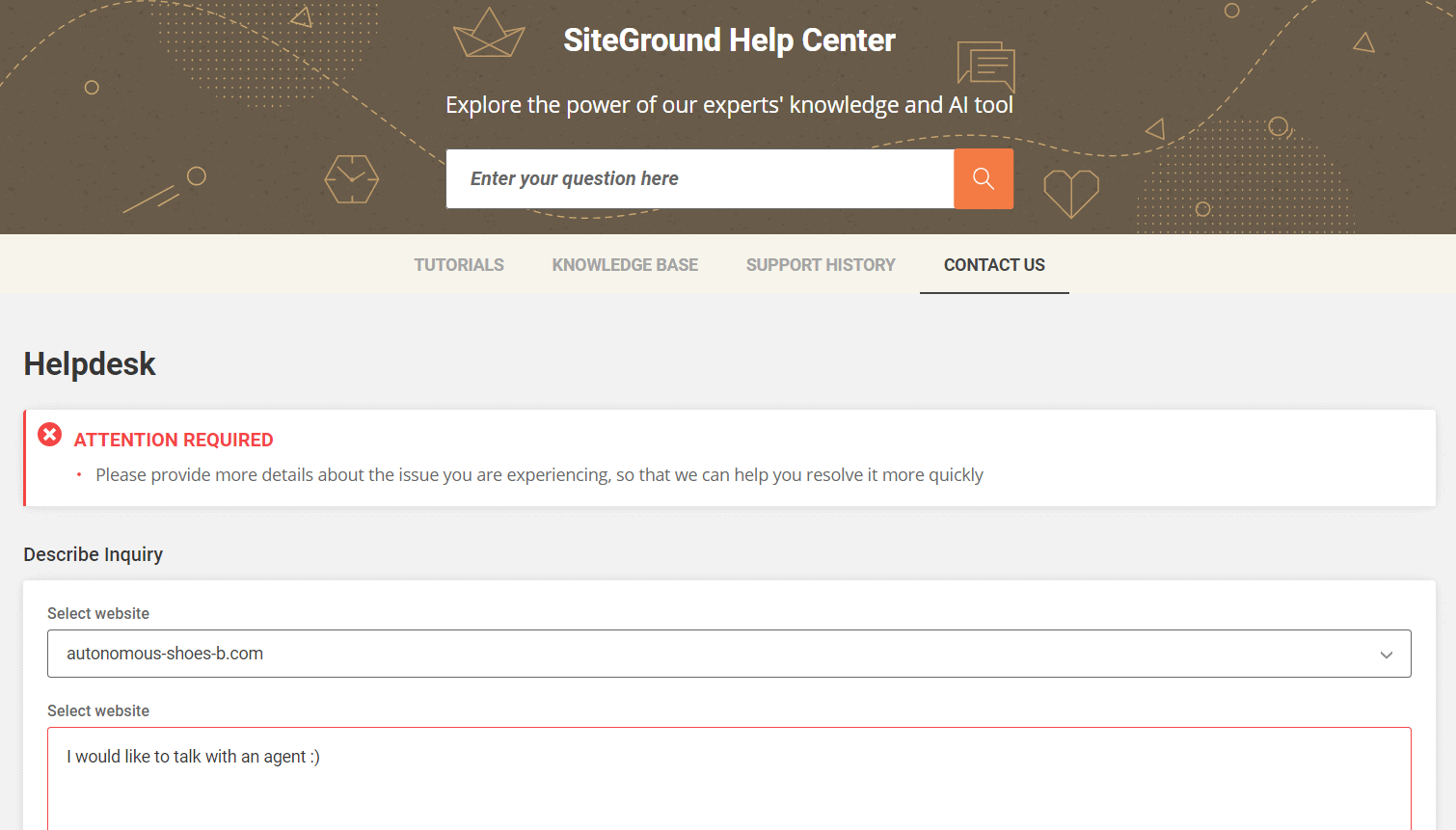
I ended up writing more, feeling both awkward and amused, knowing very well that nobody was going to read this – it’s simply there to take the wind out of the users and the load off the support agents.
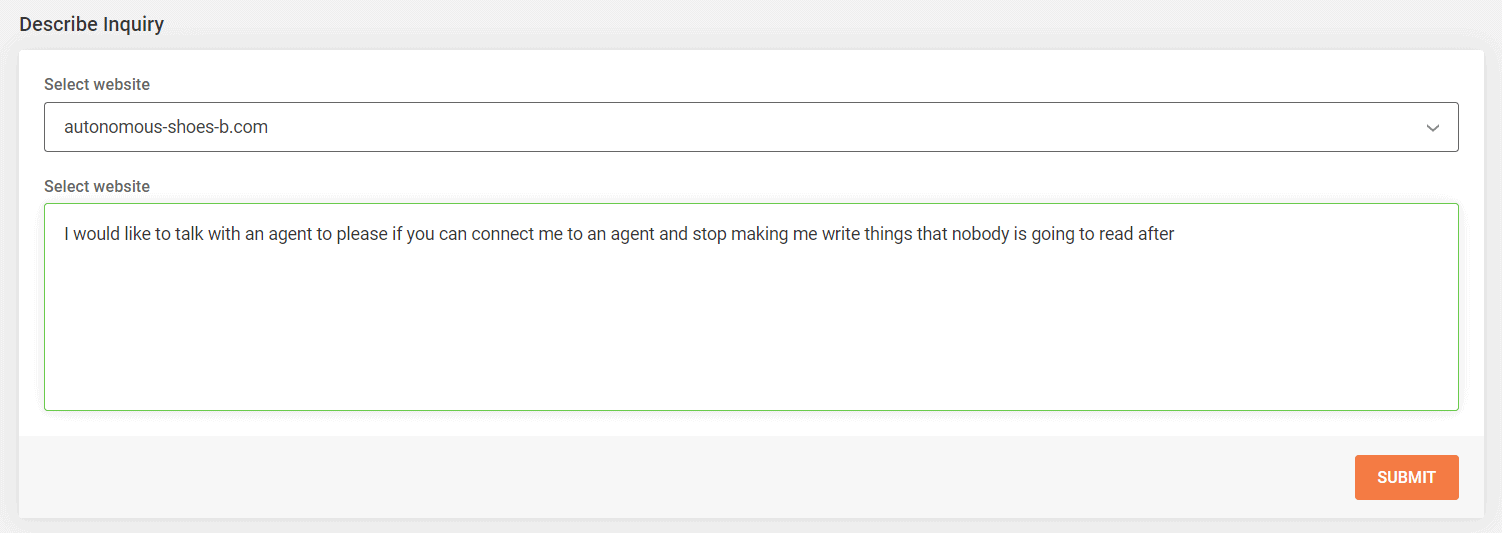
Apparently, my final attempt was detailed enough, because I was presented with the holy grail. By that, of course, I mean live chat. I’m not some weirdo who wants to talk on the phone.
This process repeated itself every single time I wanted to chat with an agent. The average waiting time for the agent was another 30 minutes, with each conversation progressing quite slowly, making each support interaction last around an hour. Not exactly the prompt support I wanted.
When I did get to talk with the agents, they were really great. Truly so. Pleasant to talk with, willing to help and go way beyond what normal support does. One of these cool guys helped me connect my domain, being super clear about the process and explaining the intricacies of each option.
When I asked for help with installing WordPress, the agent actually did it for me. That’s good service for you! He even guided me through some configurations, waiting patiently for me every step of the way.
When I installed the wrong SSL certificate on purpose, the agent reinstalled it for me, and took care of everything himself. I was grateful. Very grateful.
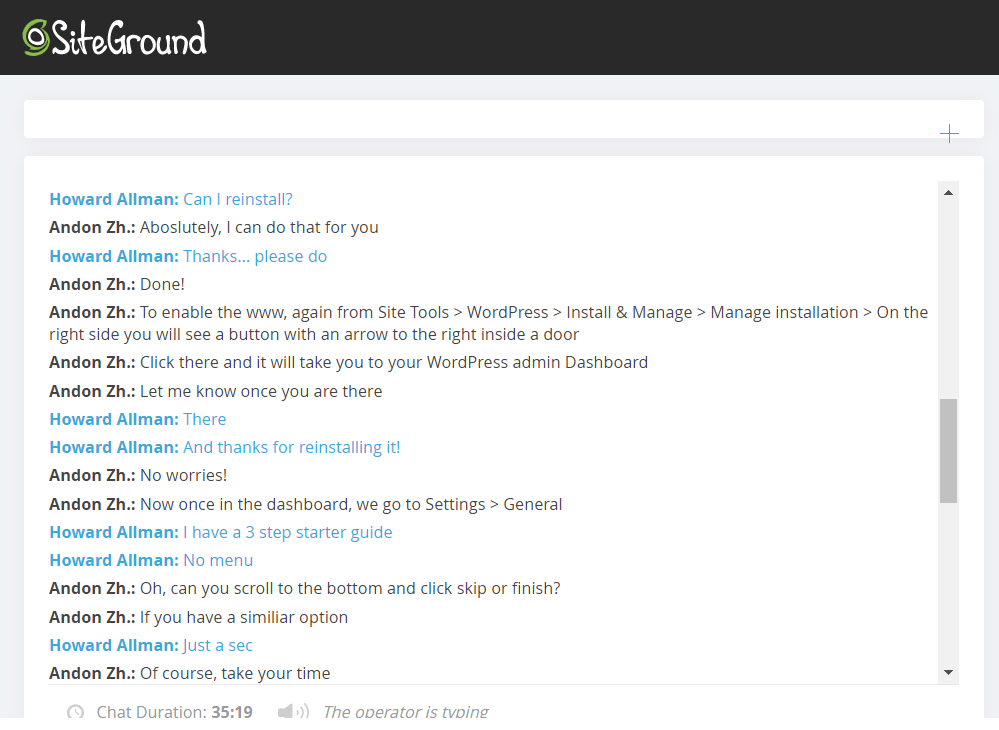
Well, so can we call this a great support service, albeit one that takes a lot of time and effort to get in touch with? No, not really. This is not based on my personal experience, but SiteGround users all over the internet have started reporting some very worrying developments.
After having a few interactions with support, they were deemed by SiteGround to be “overusing it.” I’m not sure how that’s measured, but it resulted in them being banned from using the support service for a period of time. My immediate reaction was “Say what now?!”, but this seems to be where SiteGround is headed. I guess too many people learned how to reach chat, and it was time to simply cancel it.
I hope SiteGround decides to just hire more agents instead.
PRICING
SiteGround Can Get Really Expensive
Even in its glory days, pricing was always SiteGround’s weak point. Not only are its long-term contracts more expensive than most competitors’, but the renewal prices are a whopping three times higher than the initial ones.
This makes SiteGround one of the most expensive hosting options available today, on par with real premium services like Kinsta and Liquid Web. And I’m talking about the basic plan here – for the advanced ones you’ll have to break a piggy bank or two.
Just to give you some boring technical details, the possible payment periods are 12, 24, and 36 months. A one-month “trial” is available, but I fell into that trap and got burned. You pay an extra setup fee, equal to a few months’ worth of hosting. If you decide to continue using it after the first month, you have to sign up for 12 months. You will not get your setup fee back, but you will feel stupid. I sure did.
Chatting about it with support didn’t help at all. The agent repeated how “transparent” they were trying to be, but was only willing to let me cancel the hosting completely – within the 30-day money-back guarantee. She basically made me choose between paying a ridiculous setup fee or starting over again. If it wasn’t so disgustingly sneaky, I’d commend it for being a sly sales tactic.
SiteGround accepts credit cards and PayPal – but to pay with PayPal, you have to specifically request it from support. If you do so, you’ll have to manually generate a PayPal payment request every month.
FAQ
1. Is SiteGround expensive?
SiteGround’s plans start relatively cheap. However, renewal rates can be more than three times the original amount. If you’re looking to save money, there are much cheaper options out there. For the best deals, take a look at our coupon page.
2. Does SiteGround have an uptime guarantee?
It sure does. SiteGround offers a 99.9% uptime guarantee on an annual basis. If the average uptime of your site is below 99.9% for the year, you’ll get a month of free hosting as compensation.
3. Do I need to pay extra for backups with SiteGround?
Automatic daily backups are included for free in all plans, but the StartUp plan does not include on-demand backups. You’ll have to purchase this as an add-on feature, or you can upgrade to the GrowBig plan to receive up to 5 on-demand backups.
4. Does hosting affect the speed of your website?
Your choice of web host can have a huge effect on the performance of your website. Some hosts use outdated technology or don’t optimize their platform, leading to slow speeds. But don’t worry. The hosts that make up our list of the best web hosting services in 2023 all feature great loading times.
